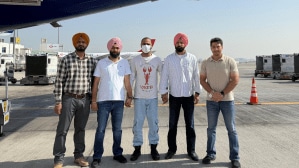Politics of appeasement
The theme of the Republic Day issue of the Organiser, brought out in a special magazine format, is ‘Appeasement Polity Versus National Unity’.

The theme of the Republic Day issue of the Organiser, brought out in a special magazine format, is ‘Appeasement Polity Versus National Unity’. In the lead article, editor R. Balashankar writes, “The politics of appeasement started by the Congress under Mahatma Gandhi in the early 1920s, resulted in the country’s vivisection. The tragic history is not forgotten. The wounds of Partition have not yet fully healed. But the UPA in the last three years has embarked on a course that mocks at those who talk about national integration. They are not taking a calculated risk but brazenly provoking a divide through cynical machinations.”
Accusing the government of appeasing the Muslim community for votes, he goes on to say, “The travesty of this vote-bank politics is that it arrests India’s growth as a strong sovereign nation… The issues that the UPA parties are parading as Muslim specific have practically nothing to do with the core concerns of Indian Muslims… Cultivating a false sense of grievance, creating a siege mentality, the UPA is consciously instigating communal hatred. How far it is going to help it electorally is to be seen, but it has severely damaged India’s march to nationhood.”
The 26 articles that follow repeat the same theme over and over again in various ways.
UPA’S anti-Hindu agenda
If most of the articles focus on the government’s alleged pro-Muslim bias, journalist Chandan Mitra accuses the Congress of being anti-Hindu. According to Mitra, “Today’s Congress leadership, despite the party’s own Hindu legacy during the freedom struggle, has made an about turn and is aggressively promoting not just minority appeasement but hard-line anti-Hindu policies.” The only example he offers is the alleged decision to “knock out” Holi from the list of gazetted holidays this year since it falls on a Sunday.
The appeasement of minorities, especially Muslims “is now an article of faith with the Sonia Gandhi-led Congress party”, he says, adding that Sonia “has not time even for the views of her Roman Catholic community’s spiritual leader, Pope Benedict XVI, who recently courted a controversy by appropriately quoting a passage that was not exactly flattering to the Muslim community.”
He goes on to argue that the Congress has fed Muslim insecurities for decades and treated the community as “a docile vote bank” while doing nothing to improve their social and economic conditions. A number of other contributors including Ram Madhav and Vasundhara Raje also argue that appeasement policies end up hurting Muslims.
Islamist grievances
Columnist Swapan Dasgupta takes a different tack and blames Muslim separatist tendencies. He writes: “After 1947, Islamist energies were focused on the defensive act of maintaining the separate identity of Indian Muslims…The ghettoisation of Muslims wasn’t merely an outcome of the benign neglect by successive Congress governments; it was simultaneously encouraged by a clergy fearful of the larger secularisation process.”
In view of this, he doubts whether economic uplift of the Muslims will succeed in marginalising extremists among them. According to Dasgupta, “There may well be some peripheral economic underpinnings of Islamism but all the indications are that Islamist grievances centre on the yearning for political power and the creation of a “pure” Islamic state. There is an inherent and irreconcilable contradiction between Islamist aspirations and the realities of a plural, democratic state which cannot be resolved by sops.”
Foreign versus domestic policy
Apart from chief ministers Vasundhara Raje and Shivraj Singh Chouhan, Sushma Swaraj is the only senior BJP leader to have written for the special issue. Swaraj repeats the standard argument that the UPA’s Muslim appeasement policy is inimical to national unity. But she also focuses on the UPA’s “dilemma” stemming out of the “totally contradictory” foreign and domestic policies. Says Swaraj, “They are having a nuclear deal with the US and on Saddam Hussein also they speak with their tongue in the cheek. A person or a party that is leaning towards the US in foreign affairs, can never be a favourite of Indian Muslims. But they are in a dilemma. On the front of foreign policy, they are toeing the line of the US, which is anathema to the Indian Muslims. On the home front, the Congress wants to woo the Muslims and ultimately the Congress is not going to get anything.”
Compiled by Manini Chatterjee






- 01
- 02
- 03
- 04
- 05

























